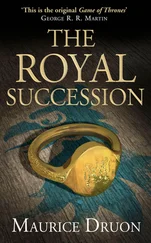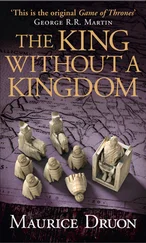Maurice Druon - The She-Wolf
Здесь есть возможность читать онлайн «Maurice Druon - The She-Wolf» — ознакомительный отрывок электронной книги совершенно бесплатно, а после прочтения отрывка купить полную версию. В некоторых случаях можно слушать аудио, скачать через торрент в формате fb2 и присутствует краткое содержание. Жанр: unrecognised, на английском языке. Описание произведения, (предисловие) а так же отзывы посетителей доступны на портале библиотеки ЛибКат.
- Название:The She-Wolf
- Автор:
- Жанр:
- Год:неизвестен
- ISBN:нет данных
- Рейтинг книги:5 / 5. Голосов: 1
-
Избранное:Добавить в избранное
- Отзывы:
-
Ваша оценка:
- 100
- 1
- 2
- 3
- 4
- 5
The She-Wolf: краткое содержание, описание и аннотация
Предлагаем к чтению аннотацию, описание, краткое содержание или предисловие (зависит от того, что написал сам автор книги «The She-Wolf»). Если вы не нашли необходимую информацию о книге — напишите в комментариях, мы постараемся отыскать её.
The She-Wolf — читать онлайн ознакомительный отрывок
Ниже представлен текст книги, разбитый по страницам. Система сохранения места последней прочитанной страницы, позволяет с удобством читать онлайн бесплатно книгу «The She-Wolf», без необходимости каждый раз заново искать на чём Вы остановились. Поставьте закладку, и сможете в любой момент перейти на страницу, на которой закончили чтение.
Интервал:
Закладка:
A servant brought hippocras and sugared almonds, which were always offered to visitors of importance. Tolomei poured the aromatic wine into goblets, helping himself to no more than one finger of the liquor to which he barely put his lips.
‘At the moment, the French Treasury seems to be in a better state than that of England,’ he added. ‘Is it known yet, Monseigneur Robert, what the figures for the year are likely to be?’
‘Provided there’s no sudden calamity during the month to run – plague, famine, or, indeed, the marriage or funeral of one of our royal relations – there’ll be a surplus of twelve thousand livres, according to the figures Messire Mille de Noyers, Master of the Exchequer, placed before us at the Council this morning. Twelve thousand livres to the good! The Treasury was certainly never in so healthy a state during the reigns of Philippe IV and V – may God put a term to the list of them!’
‘How do you manage to have surplus at the Treasury, Monseigneur?’ Mortimer asked. ‘Is it due to the absence of war?’
‘On the one hand to the absence of war and, on the other, to the fact that war is continually being prepared, but is never in fact being waged. Not to put too fine a point on it – the crusade. I must say, Charles of Valois uses the crusade to fabulous advantage. But don’t go thinking I look on him as a bad Christian. He is extremely concerned to deliver Armenia from the Turks, indeed just as much as he is to re-establish the Empire of Constantinople, whose crown he once wore though he was never able actually to occupy the throne. But a crusade cannot be organized in a day. You have to arm ships and forge weapons; above all, you have to find the crusaders, to negotiate with Spain and Germany. And the first step must be always to obtain a tithe on the clergy from the Pope. My dear father-in-law has obtained that tithe and, at the moment, the Treasury is being subsidized by the Pope.’
‘That interests me very much, Monseigneur,’ said Tolomei. ‘You see, I’m the Pope’s banker – to the extent, at least, of a quarter share with the Bardi, but even a quarter share is a very large sum – and if the Pope should become impoverished …’
Artois, who was taking a big gulp of hippocras, exploded into the silver goblet and made signs that he was choking.
‘Impoverished, the Holy Father!’ he cried as soon as he had swallowed the wine. ‘He’s worth hundreds of thousands of florins. There’s a man who could teach you your business, Spinello! What a banker he’d have made, had he not entered the priesthood. For he found the papal treasury emptier than was my pocket six years ago …’
‘I know, I know,’ Tolomei murmured.
‘The fact is, you see, the priests are the best tax-collectors God ever put on earth, and Monseigneur of Valois has grasped that fact. Instead of being ruthless about the taxes, whose collectors are hated anyway, he makes the priests collect the tithe. Oh, we shall set out on a crusade, one of these days. But, meantime, the Pope pays by shearing his sheep.’
Tolomei was gently rubbing his right leg; for some time past he had felt a sensation of cold in it, and some pain in walking.
‘You were saying, Monseigneur, that a Council was held this morning. Was anything of particular interest decided on?’ he asked.
‘Oh, just the usual stuff. We discussed the price of candles and forbade the mixing of tallow with wax, and the mingling of old jam with new. For all merchandise sold in wrappers, the weight of the wrappers is to be deducted and not included in the price. But this is all to please the common people and show them we have their interests at heart.’
Tolomei listened and watched his two visitors. They both seemed to him very young. How old was Robert of Artois? Thirty-five, thirty-six? And the Englishman seemed much the same age. Everyone under sixty seemed to him astonishingly young. How much they still had to do, how many emotions still to suffer, battles to fight and ambitions to realize. How many mornings they would see that he would never know. How often these two men would awaken and breathe the air of a new day, when he himself was under the ground.
And what kind of man was Lord Mortimer? The clear-cut face, the thick eyebrows, the straight line of the eyelids across the flint-coloured eyes, the sombre clothes, the way he crossed his arms, the silent, haughty assurance of a man who had sat on the pinnacle of power and intended to preserve all his dignity in exile, even the automatic gesture with which Mortimer ran his finger across the short white scar on his lip, all pleased the old Sienese. And Tolomei felt he would like this lord to recover his happiness. For some time past, Tolomei had acquired almost a taste for thinking of others.
‘Are the regulations concerning the export of currency to be promulgated in the near future, Monseigneur?’ he asked.
Robert of Artois hesitated before replying.
‘Oh, of course, I don’t suppose you’ve been told yet …’ Tolomei added.
‘Of course, naturally I’ve been told. You very well know that nothing is done without my advice being asked by the King, and by Monseigneur of Valois above all. The order will be sealed in two days’ time. No one will be permitted to export gold or silver currency stamped with the die of France from the kingdom. Only pilgrims will be allowed to provide themselves with a few small coins.’
The banker pretended to attach no greater importance to this piece of news than he had to the price of candles or the adulteration of jam. But he was already thinking: ‘That means foreign currency will alone be permitted to be taken out of the kingdom; as a result, it will increase in value … What a help these blabbers are to us in our profession. How the boasters give us for so little the information they could sell so dear.’
‘So, my lord,’ he went on, turning to Mortimer, ‘you intend to establish yourself in France? What can I provide?’
It was Robert who replied.
‘What a great Lord needs to maintain his rank. You’re accustomed enough to that, Tolomei.’
The banker rang a handbell. He told the servant to bring his great book, and added: ‘If Messer Boccaccio has not left, ask him to wait till I’m free.’
The book was brought, a thick volume covered in black leather, smooth from much handling, and its vellum leaves held together by adjustable fastenings so that more leaves could be added as desired. This device enabled Messer Tolomei to keep the accounts of his important clients in alphabetical order and not to have to search for scattered pages. The banker placed the volume on his knees, and opened it with some ceremony.
‘You’ll find yourself in good company, my lord,’ he said. ‘Look, honour where honour is due, my book begins with the Count of Artois. You’ve a great many pages, Monseigneur,’ he added with a little laugh, looking at Robert. ‘Here’s the Count de Bouville for his missions to the Pope and to Naples. And here’s Madame the Queen Clémence …’
The banker inclined his head in deference.
‘Oh, she gave us a lot of anxiety after the death of Louis X: it was as if mourning put her in a frenzy of spending. The Holy Father himself exhorted her to moderation in a special letter, and she had to pawn her jewels with me to pay off her debts. Now she’s living in the Palace of the Templars which she exchanged against the Castle of Vincennes; she gets her dowry and seems to have found peace.’
He went on turning over the pages which rustled under his hand.
‘And now I’m boasting,’ he thought. ‘But one must do something to emphasize the importance of the services one renders, and to show that one’s not dazzled by a new borrower.’
He had a clever way of letting them see the names while concealing the figures with his arm. He was only being half-indiscreet. And, after all, he had to admit that his whole life was contained in this book, and that he enjoyed every opportunity of looking through it. Each name, each figure evoked so many memories, so many intrigues, so many secrets of which he had been the recipient, and so many entreaties by which he had been able to measure his power. Each figure commemorated a visit, a letter, a clever deal, a feeling of sympathy or one of harshness towards a negligent debtor. It was nearly fifty years since Spinello Tolomei, on his arrival from Siena, had begun by doing the rounds of the fairs of Champagne, and then come to live here, in the Rue des Lombards, to keep a bank. 11
Читать дальшеИнтервал:
Закладка:
Похожие книги на «The She-Wolf»
Представляем Вашему вниманию похожие книги на «The She-Wolf» списком для выбора. Мы отобрали схожую по названию и смыслу литературу в надежде предоставить читателям больше вариантов отыскать новые, интересные, ещё непрочитанные произведения.
Обсуждение, отзывы о книге «The She-Wolf» и просто собственные мнения читателей. Оставьте ваши комментарии, напишите, что Вы думаете о произведении, его смысле или главных героях. Укажите что конкретно понравилось, а что нет, и почему Вы так считаете.











